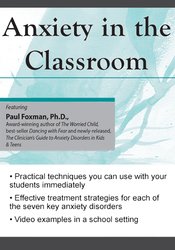

The increasing rate of stress and trauma to children, which includes divorce, global terrorism and violence, extensive technology use, media overload, bullying and diversity issues, has produced a “shell shocked” generation of students struggling to manage their anxiety. The challenge for those working in schools is to recognize the increasing anxiety level in students and help them cope.
Dr. Paul Foxman will teach you how, why and when anxiety develops in young people. The various manifestations for anxiety will be described, so that anxious students can be recognized and supported. Dr. Foxman will help you distinguish between normal anxiety and anxiety disorders, and give you a principle for making this distinction in school settings. Most importantly, you will learn practical strategies that can be applied immediately in the classroom setting and schools to reduce anxiety, enhance teaching effectiveness, and promote maximum learning.
This online program is worth 6.0 hours CPD.
| File type | File name | Number of pages | |
|---|---|---|---|
| Manual ZNM052180 (2.39 MB) | 61 Pages | Available after Purchase |

Paul Foxman, PhD, has led hundreds of workshops throughout the US and Canada, and he has appeared on television and radio as an expert on the topic anxiety. His books include The Clinician’s Guide to Anxiety Disorders in Kids & Teens (PESI, 2016), Dancing with Fear (Hunter House, 2007) and award-winning The Worried Child (Hunter House, 2004). He also co-authored a casebook, Conquering Panic and Anxiety Disorders (with Glatzer) (Hunter House, 2002). Dr. Foxman’s most recent book, Traumas and Triumphs, was published in 2022. Dr. Foxman is known for his knowledge and clarity, sense of humor, compassion, and engaging speaking style.
Dr. Foxman is a clinical psychologist, as well as founder and director of the Vermont Center for Anxiety Care. In 1985, he co-founded the Lake Champlain Waldorf School in Shelburne, VT, now flourishing from kindergarten through high school. Dr. Foxman has over 40 years of clinical experience in a variety of settings including hospitals, community mental health centers, schools, and private practice.
Dr. Foxman’s education includes Yale University (BA in Psychology), Peabody College of Vanderbilt University (PhD in Clinical Psychology), and training at the Department of Psychiatry of Mt. Zion Hospital in San Francisco, the Kennedy Child Study Center in Nashville, and the San Francisco Psychoanalytic Institute.
| 5 |
|
| 4 |
|
| 3 |
|
| 2 |
|
| 1 |
|
Satisfaction Guarantee
Your satisfaction is our goal and our guarantee. Concerns should be addressed to info@pesi.co.uk or call 01235847393.
Please wait ...